

The Largest Animal Welfare Charity in the UK. Startsida - Svenska Djurskyddsföreningen. Should Animals Have Human Rights? Paws kids. What is Animal Cruelty?
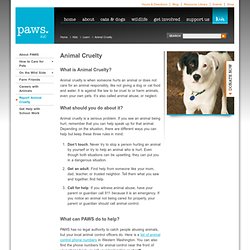
Animal cruelty is when someone hurts an animal or does not care for an animal responsibly, like not giving a dog or cat food and water. It is against the law to be cruel to or harm animals, even your own pets. It’s also called animal abuse, or neglect. What should you do about it? Animal cruelty is a serious problem. Don’t touch. What can PAWS do to help? PAWS has no legal authority to catch people abusing animals, but your local animal control officers do. Animal Aid Youth.
Teens for Research: Laboratory Animals. Importance Laboratory animal science is the area of biomedical research that specializes in the care and study of animals used in medical research, testing, and teaching.
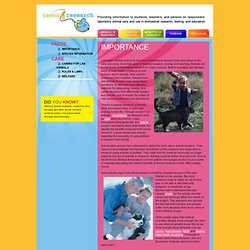
Animals are a critical part of biomedical research for many reasons. Before scientists can develop ways to treat health conditions in both humans and in animals, they need to understand the condition. Researchers use animals to learn more about these conditions; to discover more effective methods for diagnosing, treating, and curing diseases that affect both humans and animals; and to ensure the safety of new medical treatments and procedures. Thanks to animal research, scientists have discovered ways to save and prolong human life. Animal rights groups have attempted to distort the facts about animal research.
Some people argue that animal research should be stopped because of the pain inflicted on the anima ls. Other people argue that medical scientists already know enough; we need to use what we already know. Eco Friendly Kids: Animal Rights. Author: Beth Morrisey MLIS - Updated: 29 January 2014| Comment Animal rights are exactly what the title says - those rights that belong to animals.
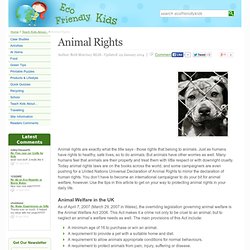
Just as humans have rights to healthy, safe lives, so to do animals. But animals have other worries as well. Many humans feel that animals are their property and treat them with little respect or with downright cruelty. Animal Welfare in the UK As of April 7, 2007 (March 29, 2007 in Wales), the overriding legislation governing animal welfare is the Animal Welfare Act 2006. Petakids. General Animal Rights FAQs “What do you mean by ‘animal rights’?”
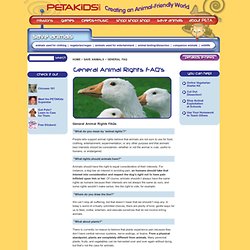
People who support animal rights believe that animals are not ours to use for food, clothing, entertainment, experimentation, or any other purpose and that animals’ best interests should be considered—whether or not the animal is cute, useful to humans, or endangered. “What rights should animals have?” Animals should have the right to equal consideration of their interests. For instance, a dog has an interest in avoiding pain, so humans should take that interest into consideration and respect the dog’s right not to have pain inflicted upon him or her. “Where do you draw the line?” We can’t stop all suffering, but that doesn’t mean that we shouldn’t stop any.
“What about plants?” There is currently no reason to believe that plants experience pain because they don’t have central nervous systems, nerve endings, or brains. It is impossible to live without causing some harm. Dominion is not the same as tyranny. Wrong! Djurens Rätt. People for the Ethical Treatment of Animals (PETA) WWF: Illegal Wildlife Trade. The world is dealing with an unprecedented spike in illegal wildlife trade, threatening to overturn decades of conservation gains.
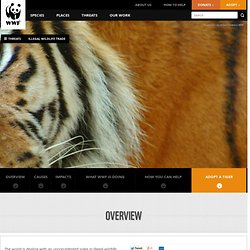
Ivory estimated to weigh more than 23 metric tons—a figure that represents 2,500 elephants—was seized in the 13 largest seizures of illegal ivory in 2011. Poaching threatens the last of our wild tigers that number as few as 3,200. Wildlife crime is a big business. Run by dangerous international networks, wildlife and animal parts are trafficked much like illegal drugs and arms. By its very nature, it is almost impossible to obtain reliable figures for the value of illegal wildlife trade. Some examples of illegal wildlife trade are well known, such as poaching of elephants for ivory and tigers for their skins and bones. Stamping out wildlife crime is a priority for WWF because it’s the largest direct threat to the future of many of the world’s most threatened species. WWF: Unsustainable and illegal wildlife trade. What is wildlife trade?
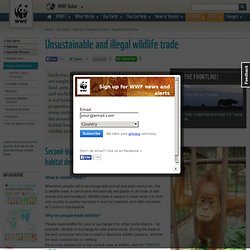
Whenever people sell or exchange wild animal and plant resources, this is wildlife trade. It can involve live animals and plants or all kinds of wild animal and plant products. Wildlife trade is easiest to track when it is from one country to another because it must be checked, and often recorded, at Customs checkpoints. Why do people trade wildlife? People trade wildlife for cash or exchange it for other useful objects - for example, utensils in exchange for wild animal skins. For a more detailed list of the various uses of wildlife, visit the TRAFFIC website.